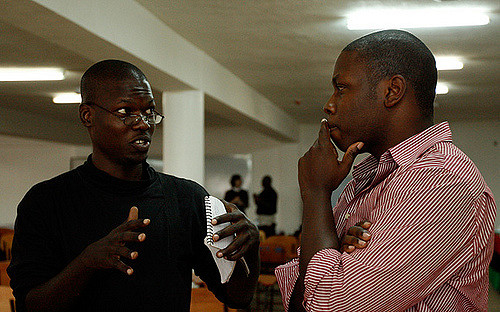Fair Enough: How Managers Can Establish a Fair Identity
[ We’re pleased to welcome Terri Scandura of University of Miami, who co-authored an article in Journal of Leadership and Organizational Studies entitled “Getting to ‘Fair’: Justice Interactions as Identity Negotiation” with Cecily Cooper of University of Miami.]
We’re pleased to welcome Terri Scandura of University of Miami, who co-authored an article in Journal of Leadership and Organizational Studies entitled “Getting to ‘Fair’: Justice Interactions as Identity Negotiation” with Cecily Cooper of University of Miami.]
Fairness is a necessary condition for effective leadership (Scandura, 1999). But how does a manager negotiate a fair identity with followers and what do followers contribute to this identity? How does this process unfold over time? How does having a fair identity benefit a manager? How does it lead to better relationship with followers? How do fair relationships benefit the organization?
We know that managers care about fairness and try to be fair (or at least appear fair) (Greenberg, 1988). Research on organizational justice has found that fairness issues are important to employees and link to performance withdrawal and counterproductive behavior (Conlon et al., 2005). Given this importance, we were motivated to better understand the process of how managers come to be seen as “fair managers” by subordinates. We developed a model that considers both manager and subordinates as mutually influential on judgments of a manager’s fairness, rather than focusing solely on the subordinate’s perspective. Our model examines the emergence of a manager’s fair identity over time.
Our paper adopts a perspective from social psychology to better understand how
managers come to be viewed as fair called “identity negotiation” (Swann, 1987). This framework focuses on the interplay between self- and other-perceptions within leader-member relationships. This approach is particularly appropriate for informing justice research on the issue of justice perceptions of managers. People self-verify to increase their perception of predictability and control over their environment. Individuals desire to be seen “accurately” by others (i.e., they want others to see them as they see themselves). In the case of fairness, managers who care about being seen as fair by followers engage in a negotiation process with followers that results in a fair identity – “getting to fair,” just as negotiators engage in exchanges that result in “getting to yes.”
For managers, being seen as fair is central to building positive relationships with subordinates and achieving optimum functioning of the work unit. Our discussion, regarding how a general perception of fairness is formed, offers a number of key takeaways for attaining and maintaining a fair identity.
- By emphasizing the role of justice negotiation events, managers are more aware that subordinates may offer explicit feedback regarding fairness. Moreover, when explicit feedback is given, managers should be careful not to react defensively.
- Justice negotiation events should be seen as an opportunity to address fairness concerns and negotiate the preferred fairness identity. To capitalize on these discussions, managers would be wise to develop their conflict management skills.
- Managers should negotiate a positive fairness identity as early as possible in the relationship since entity perceptions will affect future events. Managers should also be cognizant of the fact that they are never completely “off the hook” when it comes to managing their fairness. Although perceptions can be formed early on, both parties continue to negotiate this fair identity throughout the entire working relationship. A pivotal justice negotiation event could impact perceptions of managerial fairness at any point in time.
- Organizations must be mindful that they often communicate the identities members are supposed to assume (Swann et al., 2009). Thus, if organizations emphasize certain attributes, which conflict or compete with the fairness identity (e.g., being efficient, powerful, or frugal), they may unwittingly undermine managerial efforts to establish fair identities.
In sum, a working understanding of how events develop into a reputation for being fair and how this must be managed over time is inherently useful and beneficial for managers and organizations. Our paper articulates the development of the fair identity, therefore making these implicit processes explicit so that managers can better understand how to optimize long-term manager-subordinate relationships.
References
Conlon, D., Meyer, C., & Nowakowski, J. (2005). How does organizational justice affect, performance, withdrawal, and counterproductive behavior? In J. Greenberg & J. Colquitt (Eds.), Handbook of Organizational Justice (pp. 301-327). New Jersey: Lawrence Erlbaum Associates.
Greenberg, J. (1988). Cultivating an image of justice: Looking fair on the job. Academy of Management Executive, 2(2), 155-157.
Scandura, T. A. (1999). Rethinking Leader-member exchange: An organizational justice perspective. The Leadership Quarterly, 10, 25-40.
Swann, W. (1987). Identity negotiation: Where two roads meet. Journal of Personality and Social Psychology, 53(6), 1038-1051.
You can read “Getting to ‘Fair’: Justice Interactions as Identity Negotiation” from Journal of Leadership and Organizational Studies by clicking here. Want to know all about the latest research from Journal of Leadership and Organizational Studies? Click here to sign up for e-alerts!




























































































